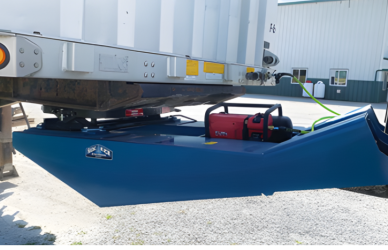Washtenaw Community College in Ann Arbor, Michigan is expanding its truck driving training program due to high demand and its growing popularity. In response to this, a second instructor will be joining the course to accommodate the increased number of students.
“Across Michigan and throughout the U.S., there’s still a large demand for CDL drivers,” said Jim Brywczynski, vice president of sales and marketing for Trainco. “WCC has done an amazing job hosting this program.”
The college has recently partnered with Trainco Inc. to offer an exclusive CDL-A training program through its Workforce and Community Development Division. This program aims to provide the necessary skills and training to meet the pressing workforce needs in our community.
Since its launch just 10 months ago, nearly 40 students have successfully graduated from this program. Even better, 37 of them have already been offered jobs.
Their training sessions run for three weeks, accommodating up to six students at a time. Due to high demand, there is currently a waiting list, so be sure to secure your spot for the next session starting on July 26.
During the program, students will receive comprehensive training on campus, with a designated WCC parking lot for skills pad practice. The training consists of 150 hours in total, including 50 hours of classroom instruction, 50 hours of skills pad practice, and 50 hours of supervised driving experience.
This community-based, grassroots program has gained recognition from various organizations promoting careers in the trucking and transportation field. It serves as a fantastic entry point for individuals considering a fulfilling and promising career in this industry.
“American Trucking Associations is predicting a driver shortage of 160,000 by 2030,” said Lindsey Trent, founder and president of advocacy nonprofit group Next Generation in Trucking Association. “Truck driving is a secure job that is considered high wage, high skill and high demand. Expanding training and making it more accessible to the next generation is the mission of Next Generation in Trucking. There is no other training in the time frame that is offered that can pay as well as a CDL.”
The U.S. Bureau of Labor Statistics predicts over 250,000 openings for truck drivers by 2031. With retirements on the rise, now is the perfect time to join the industry.
Trainco Inc., a leading truck training company in Ohio and Michigan, has been helping drivers launch successful careers for over 20 years. Their graduates have a whopping 90% employment rate.
CDL-A drivers in Michigan could earn an average of nearly $63,700 per year. For new drivers, starting salaries range from $50,000 to $95,000 annually.
Trainco’s director, Mr. Brywczynski, said he personally assists students in finding job placements and even connects them with companies willing to cover their tuition in exchange for a year of work.
ATA Chief Economist Bob Costello has been a long-time advocate for the importance of attracting younger individuals to the industry.
“The trucking industry needs to find ways to attract more and younger drivers,” Costello said. “Right now, the average age of an over-the-road driver is 46 years old, and almost as alarming is that the average age of a new driver being trained is 35 years old.
“Whether by removing barriers for younger drivers to begin careers as drivers, attracting more demographic diversity into the industry or easing the transition for veterans, we need to do more to recruit and retain drivers.”
Encouraging apprenticeships through private sector and government initiatives is an effective approach to attract younger individuals and more women to the industry, according to Costello and ATA.
To support this effort, the Department of Transportation has introduced the Safe Driver Apprenticeship Pilot Program as part of the Biden administration’s infrastructure bill. This program enables 18-, 19-, and 20-year-olds to drive interstate after undergoing thorough training.
Former certified nurses’ aide, Lauren Kakaley, is now a successful graduate of Trainco. After completing the program in April, she has secured a position with a Tampa, Fla.-based company specializing in agriculture product transportation. Lauren’s journey to this point began with her decision to enroll in the program after being a stay-at-home mom. Prior to that, she had attended WCC for her medical care program. Now, she has successfully re-entered the workforce and is thriving in her new role.
“I wanted to change it up,” Kakaley said. “The first day, we were in the classroom for a few hours and then the instructor made us drive. He wasn’t just lecturing all the time. The class was very active, and he was very engaging. It was pretty intimidating, but it was exciting.”
Source: Transport Topics











